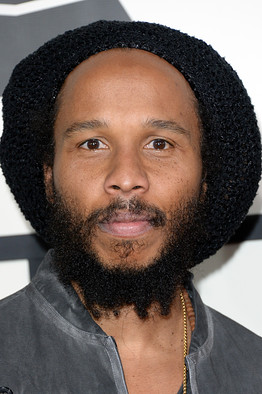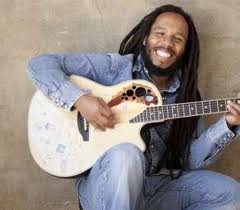New York’s Bryant Park has been transformed into #Pepcity, a three-day Super Bowl festival sponsored by Pepsi that includes gourmet food stands, art exhibitions and a free concert Saturday night featuring Austin Mahone, Prince Royce and Ziggy Marley.
Marley, who is the son of reggae icon Bob Marley, is receiving particular attention for winning best reggae album at last week’s Grammy Awards. Tonight’s 45-minute acoustic performance will kick off a very busy year for the artist. Later this month, he’ll embark on an 11-city tour to celebrate his new album, “Fly Rasta,” and will also be promoting his first children’s book, “I Love You, Too.” Both projects are available for pre-order now and will be released in April.
Speakeasy caught up with Marley at his hotel in Manhattan’s TriBeCa neighborhood to discuss his new projects, and his thoughts on marijuana legislation. Here is an edited excerpt.
Recording must get a little boring after 15 albums. How did you approach “Fly Rasta” to keep the process interesting for you?
When I started to record this album, I remember I wrote down a short list of things I wanted to try to accomplish. One of them was pushing the boundaries of my genre, one was to propel reggae music into the future, but the hardest was to write complete songs that had no filler. Thinking of my music that way was a new challenge. I didn’t want any song to be where it wasn’t supposed to be. That’s why I only have 10 songs on the album, they’re complete and enough.
Has your music philosophy changed over the years? How have you managed to stay the course?
I don’t chase what I hear on the radio. I try not to compete with anybody. And even though I’m a musician, I don’t necessarily follow a certain set of rules. Sometimes my mistakes turn into interesting music because I do things that aren’t supposed to be done. Really it’s more about a state of mind. I grew up with a certain standard of music, watching my father and his peers. For them, music had a deeper purpose than one’s own selfish gain. It was never just a business.
So how do you reconcile the fact that this is a business? Karen O’s cover of “I Shot the Sheriff” is the soundtrack to a new Sonos commercial that aired during the Grammys. Isn’t that advertising?
Of course. But exposure is not just about the check. Underneath that is the idea of spreading your message and getting your music heard. The industry has changed so much, especially with licensing. It’s no longer taboo. It’s opportunity.
You’ve become a bit of a poster boy for the movement to legalize marijuana. As it gains steam, is this a role you’re comfortable with, or does it get distracting after a while?
No, no, it’s good. My connection with the plant is my connection with nature. It goes beyond smoking or whatever initial layer people like to see. There are industrial and environmental issues that this plant can help solve, and I stand by it. But I do try to keep my connection to it within my private, spiritual life. It’s not something I boast or flaunt. I’ve never thought of marijuana as something I need to demonstrate to everyone. It’s not who I am as an artist.
- Ziggy Marley
How do you talk to your kids about it?
I keep it simple. That works with kids. I explain to them that nature has lots of uses, including medicinal, like Tylenol. How do you explain Tylenol to kids? You break it down, and it all comes back to plants and the way different people choose to use them. Marijuana has had a veil of dark misconceptions for a long time and it’s slowly being pulled back. It’s nice to see more open-mindedness.
You’ve released several children’s albums in the past. Why expand into children’s books? What about the medium appealed to you?
I’m a big reader. My kids love reading and I think it’s important not just for development, but for bonding. You start reading to kids before they can even understand what you’re saying to them, so I look at it as a fundamental tool for connection. And I still like the old fashioned stuff. Turning the pages with your children before bed every night is a special thing.
Remember, before there were books, there was storytelling. When I was growing up, we had blackouts in Jamaica where every night, during certain hours, we’d have no power. My Grandma would round all of us together and tell us stories. I’ve never forgotten that. Even now in my house we try to keep the TV off during the week. That little bit of disconnection gives us room to read and talk to each other.
What’s the story behind the book’s title?
It came from my family. When my daughter Judah was two or three years old, I went into the kitchen and she said, “I love you.” It was totally spontaneous. We weren’t having a conversation, I hadn’t said anything to provoke it, she just came out of the blue and said, “I love you.” So I said, “oh, I love you, too.” It was one of those moments you have as a parent that comes out of nowhere but means everything.











